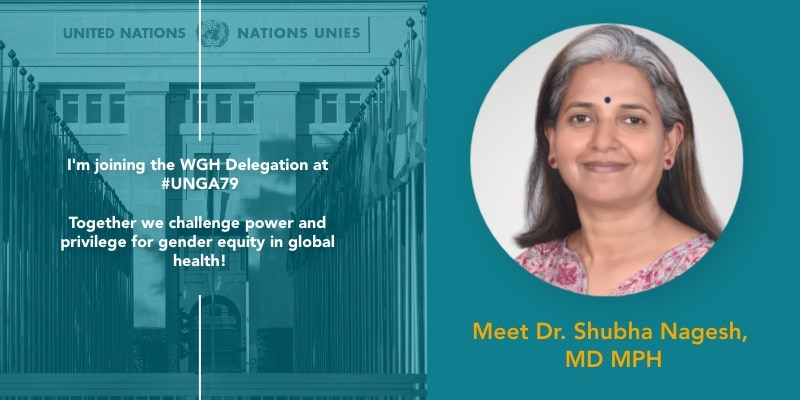Breaking Barriers: What global health means for women leaders at UNGA 79
17 September 2024

This blog embodies my journey as a woman leader from a modest hill state in India, to the UNGA in New York. My hopes are immense; I aspire to use this platform to amplify the voices of women like myself, often overlooked, and to spotlight the unique health challenges faced by those in rural and underserved regions. I envision global health strategies that are inclusive and equitable, reflecting the realities of those far from the corridors of power. Yet, I am also apprehensive about whether my voice will be heard among so many influential leaders, fearing that the urgent needs of women from small towns might be overshadowed. Balancing these emotions—hopeful advocacy and nervous participation—drives me to ensure that all women’s perspectives, regardless of their origins, are included in this vital conversation.
As I prepare to join the official UNGA delegation in New York next week, I reflect on how the global health landscape has been shaped by powerful women leaders. Despite significant progress, more women are needed at the forefront to drive transformative change. Effective political participation and decision-making by women are crucial for addressing global priorities in an inclusive and decisive manner. The recent global crises, such as the COVID-19 pandemic, have highlighted the impact of women’s leadership. Evidence shows that countries with higher female representation prioritize issues like health, education, and violence against women more effectively. The UNDP-UN Women COVID-19 Global Gender Response Tracker indicates that governments with higher female representation in parliaments adopted more gender-sensitive policy measures, focusing on enhancing women’s economic security.
Ms. Sima Bahous, Executive Director of UN Women, emphasizes:
“When more women lead in political and public life, everyone benefits, especially in crises. A new generation of girls sees a possible future for themselves. Health, education, childcare, and violence against women receive greater attention and better solutions. We must amplify the assets women leaders bring. This Platform is an opportunity to do just that.”
Recent achievements by remarkable women leaders underscore the importance of gender-inclusive leadership. Dr. Gro Harlem Brundtland, former Prime Minister of Norway and ex-Director-General of WHO, highlighted the need for addressing broad determinants of health and ensuring universal access to essential services. Dr. Maria Van Kerkhove and Dr. Soumya Swaminathan, pivotal figures in the WHO’s COVID-19 response, showcased the critical role of women in crisis management. Dr. Ngozi Okonjo-Iweala, Director-General of the WTO, has worked to remove trade barriers to improve access to medicines. Dr. Phumzile Mlambo-Ngcuka, former Executive Director of UN Women, has championed gender-sensitive health policies. These leaders demonstrate that skilled, gender-inclusive leadership is essential for effective crisis management and health equity.
As heads of state gather in New York this September, they have the opportunity to reshape global cooperation and begin a new chapter in the UN’s nearly 80-year history. What unfolds next week should reflect both our concerns and our highest aspirations. The United Nations General Assembly is more than a distant spectacle; it’s a vital forum where the voices of ordinary citizens converge to influence our collective present and future. Decisions made here have a direct impact on our daily lives.
As one of many women leaders at UNGA, I feel deeply empowered yet humbled; filled with excitement, yet tinged with nervousness. This platform offers a powerful opportunity to influence change, but also carries the weight of ensuring my voice resonates amidst many others. The privilege of attending in person contrasts starkly with the reality faced by many women absent due to funding or visa barriers. Their voices are equally crucial. Leadership is not reserved for the famous few, but it is a collective force that includes us all. I feel a profound responsibility to elevate our shared voices and advocate for those who cannot be here, ensuring every woman’s perspective is included in this critical global dialogue.
Call for action at UNGA 79
SDG 5: Gender Equality demands renewed focus at UNGA 79. As we approach this pivotal assembly, my deep hope is to elevate women leaders in shaping global health and advancing the 2030 Agenda for Sustainable Development. Women are essential to driving change, advocating for gender equality, and addressing the pandemic’s impact on vulnerable groups. Gender equality must be central to these efforts, essential for ending poverty and securing peace. Let’s ensure that women’s voices and expertise are integral to shaping the future of global health and that this year’s UNGA highlights the crucial role of women in political leadership.
Written by: Dr. Shubha Nagesh, MD MPH